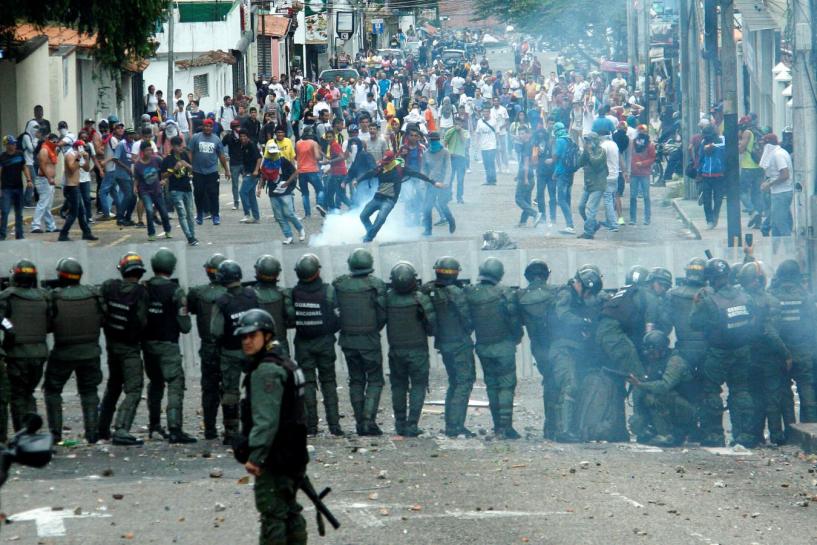State violence at opposition protests in Venezuela


Protests in Venezuela continued against the embattled administration of President Nicolas Maduro Monday, with almost two hundred demonstrators arrested, and dozens injured and teargassed, including a state governor, a national lawmaker and a Grammy winner.
The Maduro administration seemed to be caving in to a key opposition demand, elections, Sunday, when Nicolas Maduro himself said that he was “anxious” to hold elections, promising to “beat up” the opposition, only days after saying there would not be any electoral contests in Venezuela in the foreseeable future.
GRAMMY-WINNER NACHO HIT
Opposition leader and Miranda state governor Henrique Capriles Radonski, who was barred by the Maduro administration from running for office for the next 15 years, inhaled tear gas, again Monday, while leading a march trying to reach the office of Ombudsman Tareck William Saab.
Female lawmaker Delsa Solorzano was hit in the chest by a tear gas grenade, and, later, the Las Mercedes clinic where she was being treated was, again, teargassed by police.
And “reggaeton” superstar Nacho, formerly in duo “Chino y Nacho”, inhaled tear gas deployed by National Guard and Police in the Francisco Fajardo highway, Caracas’ main crosstown thoroughfare.
Venezuelan human-rights NGO Foro Penal tweeted Monday that 188 individuals have been arrested since April 4th, when a new wave of massive anti-Maduro protests began, triggered by a legislative coup attempt by the executive-controlled Supreme Court against the opposition-held National Assembly.
Days after the Supreme Court maneuver, Attorney General Luisa Ortega broke ranks with the Maduro administration, publicly admitting in a speech that, indeed, the Court had staged a bloodless coup by trying to usurp Assembly functions.
With single-digit approval rates, Maduro seems to be trying everything, at once, to diminish discontent.
He promised elections on Sunday but deployed tear gas grenades from police helicopters on Monday, a novelty in Venezuelan law enforcement.
Maduro was in Cuba, at a summit for the ALBA trading bloc founded by Hugo Chavez, his late mentor and predecessor, after admitting Sunday that the opposition’s protests were hampering his ability to operate as President, to the point where he can no longer announce live presentations in advance.
On Monday, the government closed 18 subway stations (a new record) to prevent attendance for the protest, slowed down internet, blocked the signal of TV stations, attacked journalists (injuring at least one), downed a drone with live gunfire and still could not control the protest.
Over the weekend, CICPC criminal police posted on Twitter pictures of demonstrators, asking users to help identify them and labelling the portrayed individuals as “generators of violence”, but after public outcry suspended the practice and erased the tweets.





